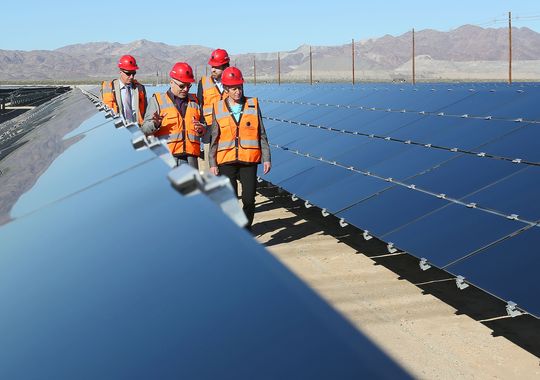forum
library
tutorial
contact

Solar Energy:
Tribes Try to Block Project
by David Danelski
The Press Enterprise, March 17, 2015
|
the film forum library tutorial contact |

|
Solar Energy:
by David Danelski
|
Colorado River Indian Tribes seek court injunction to block construction
of Blythe solar project until lawsuit is resolved.
 The Colorado River Indian Tribes have asked a federal judge to block construction of a 6-square-mile solar energy project near Blythe until a legal challenge to the project's approval is resolved.
The Colorado River Indian Tribes have asked a federal judge to block construction of a 6-square-mile solar energy project near Blythe until a legal challenge to the project's approval is resolved.
According to court papers filed Monday, March 16, in federal District Court in Los Angeles, the tribes contend that allowing construction of the Blythe Solar Power Project would cause "substantial, irreparable, and immediate harm" by destroying artifacts from their ancestral lands and other resources they consider to be sacred.
Construction is scheduled to begin next month, according to court papers.
The request for a preliminary injunction, filed with Judge John A. Kronstadt, follows a December lawsuit filed by the tribes that seeks to nullify the project's approval. The suit argues that the Bureau of Land Management violated several federal laws governing environmental and cultural reviews when it approved the project.
These laws included requirements that the tribes be properly consulted about the project's impacts on native artifacts and other cultural resources, the suit says.
BLM spokesman Stephen Razo disputed the tribes' argument.
"BLM held individual meetings with interested tribes and made other efforts, including site visits and individual meetings with tribal members and tribal council members, as part of the government-to-government consultation process," Razo said in an e-mail.
The project's developer, Florida-based NextEra Energy Resources, declined to comment, according to an e-mail from a company spokesman.
The project calls for building solar arrays using photovoltaic panels on 4,138 acres of public land a few miles northeast of Blythe. It would have a capacity of 485 megawatts -- enough electricity for about 100,000 California homes.
It had been approved in 2010 for a different technology -- solar troughs -- but it underwent a second round of reviews after the project was acquired by NextEra, and the Juno Beach, Fla.-based company decided to change the technology to photovoltaic panels.
The project went through a "fast track" approval process so developers could qualify for federal economic stimulus dollars.
learn more on topics covered in the film
see the video
read the script
learn the songs
discussion forum
